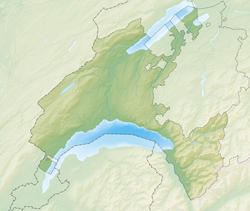Monnaz
| Monnaz | ||
|---|---|---|
| Former municipality of Switzerland | ||
|
||
| Coordinates: 46°32′N 06°29′E / 46.533°N 6.483°ECoordinates: 46°32′N 06°29′E / 46.533°N 6.483°E | ||
| Country | Switzerland | |
| Canton | Vaud | |
| District | Morges | |
| Government | ||
| • Mayor | Gilles Cornut | |
| Area | ||
| • Total | 1.61 km2 (0.62 sq mi) | |
| Elevation | 485 m (1,591 ft) | |
| Population | ||
| • Total | 396 | |
| • Density | 250/km2 (640/sq mi) | |
| Postal code | 1125 | |
| SFOS number | 5641 | |
| Surrounded by | Colombier, Echichens, Morges, Saint-Saphorin-sur-Morges, Vaux-sur-Morges, Vufflens-le-Château | |
| Website |
www Profile (French), SFSO statistics |
|
Monnaz was a municipality in the Swiss canton of Vaud, located in the district of Morges.
The municipalities of Colombier, Monnaz and Saint-Saphorin-sur-Morges merged on 1 July 2011 into the municipality of Echichens.
Monnaz is first mentioned in 1200 as Monna. In 1221 it was mentioned as Muna.
Monnaz had an area, as of 2009[update], of 1.6 square kilometers (0.62 sq mi). Of this area, 1.17 km2 (0.45 sq mi) or 72.7% is used for agricultural purposes, while 0.27 km2 (0.10 sq mi) or 16.8% is forested. Of the rest of the land, 0.15 km2 (37 acres) or 9.3% is settled (buildings or roads).
Of the built up area, housing and buildings made up 6.8% and transportation infrastructure made up 1.9%. Out of the forested land, 13.0% of the total land area is heavily forested and 3.7% is covered with orchards or small clusters of trees. Of the agricultural land, 65.8% is used for growing crops and 1.9% is pastures, while 5.0% is used for orchards or vine crops.
The municipality was part of the Morges District until it was dissolved on 31 August 2006, and Monnaz became part of the new district of Morges.
The former municipality is located on the left bank of the Morges river.
The blazon of the municipal coat of arms is Azure, a Saltire Or, two Grape bunches and as many Mullets of Five of the same.
Monnaz has a population (As of 2009[update]) of 396. As of 2008[update], 15.9% of the population are resident foreign nationals. Over the last 10 years (1999–2009 ) the population has changed at a rate of 43.5%. It has changed at a rate of 29% due to migration and at a rate of 14.9% due to births and deaths.
...
Wikipedia




